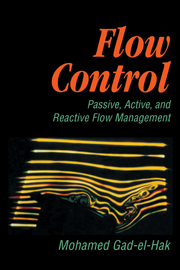Book contents
- Frontmatter
- Contents
- Preface
- Nomenclature
- 1 Introduction
- 2 Governing Equations
- 3 Unifying Principles
- 4 Coherent Structures
- 5 Reynolds Number Effects
- 6 Transition Control
- 7 Compliant Coatings
- 8 Separation Control
- 9 Low-Reynolds-Number Aerodynamics
- 10 Drag Reduction
- 11 Mixing Enhancement
- 12 Noise Reduction
- 13 Microelectromechanical Systems
- 14 Frontiers of Flow Control
- Epilogue
- Bibliography
- Index
1 - Introduction
Published online by Cambridge University Press: 23 December 2009
- Frontmatter
- Contents
- Preface
- Nomenclature
- 1 Introduction
- 2 Governing Equations
- 3 Unifying Principles
- 4 Coherent Structures
- 5 Reynolds Number Effects
- 6 Transition Control
- 7 Compliant Coatings
- 8 Separation Control
- 9 Low-Reynolds-Number Aerodynamics
- 10 Drag Reduction
- 11 Mixing Enhancement
- 12 Noise Reduction
- 13 Microelectromechanical Systems
- 14 Frontiers of Flow Control
- Epilogue
- Bibliography
- Index
Summary
Thinking is one of the greatest joys of humankind.
(Galileo Galilei, 1564–1642)The farther backward you can look, the farther forward you are likely to see.
(Sir Winston Leonard Spencer Churchill, 1874–1965)PROLOGUE
The subject of flow control is broadly introduced in this first chapter, leaving much of the details to the subsequent chapters of the book. The ability to manipulate a flowfield actively or passively to effect a desired change is of immense technological importance, and this undoubtedly accounts for the subject's being more hotly pursued by scientists and engineers than any other topic in fluid mechanics. The potential benefits of realizing efficient flow-control systems range from saving billions of dollars in annual fuel costs for land, air, and sea vehicles to achieving economically and environmentally more competitive industrial processes involving fluid flows. In this monograph both the classical tools and the more modern strategies of flow control are covered. Methods of control to achieve transition delay, separation postponement, lift enhancement, drag reduction, turbulence augmentation, and noise suppression are considered. The treatment is tutorial at times, which makes the material accessible to the graduate student in the field of fluid mechanics. Emphasis is placed on external boundary-layer flows, although applicability of some of the methods discussed for internal flows as well as free-shear flows will be mentioned.
- Type
- Chapter
- Information
- Flow ControlPassive, Active, and Reactive Flow Management, pp. 1 - 9Publisher: Cambridge University PressPrint publication year: 2000
- 1
- Cited by



